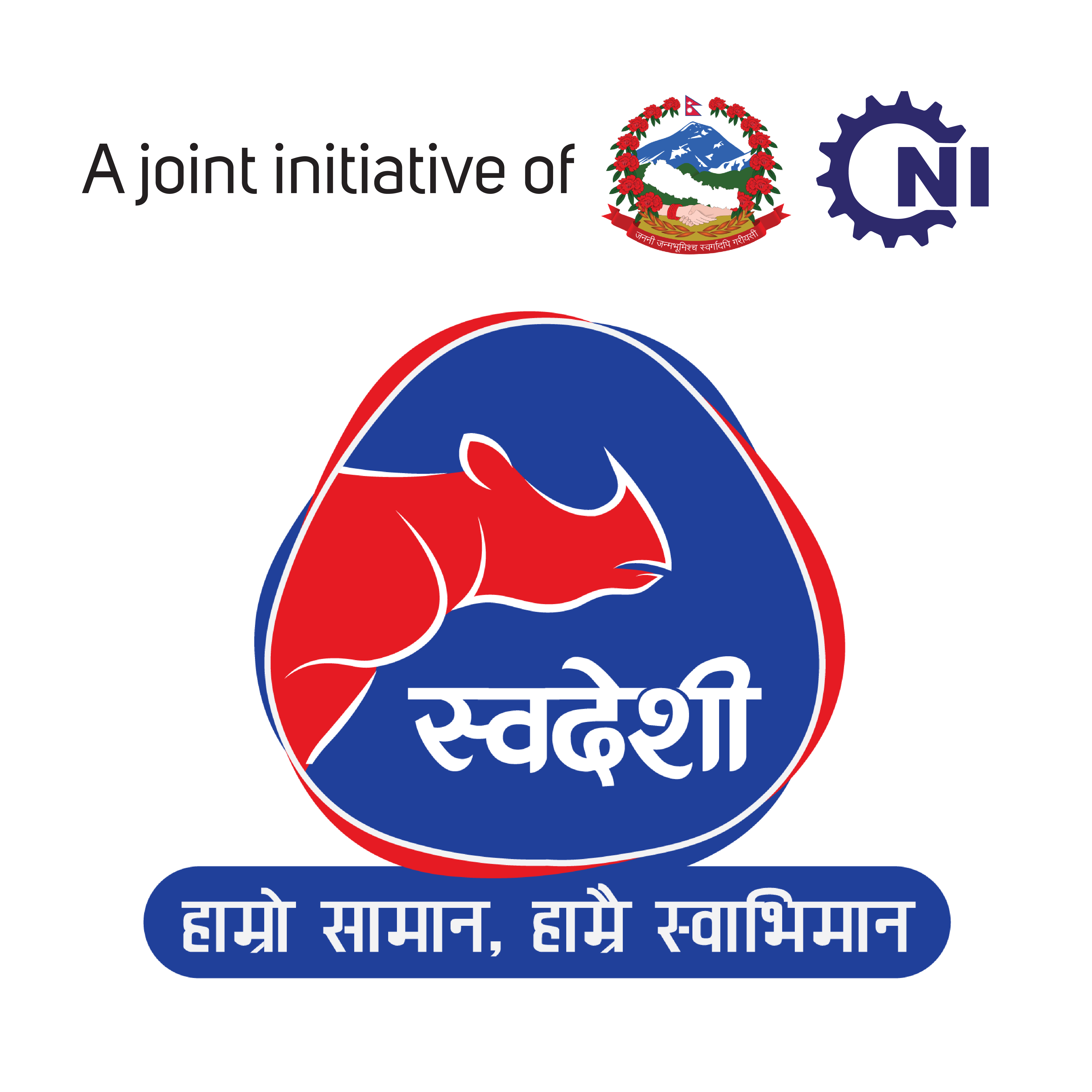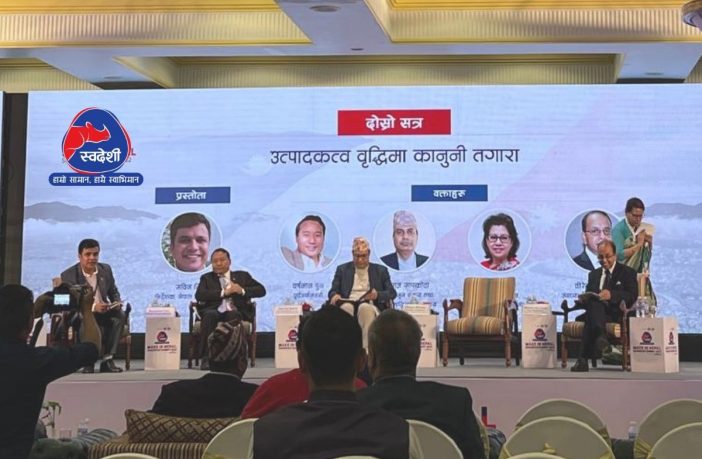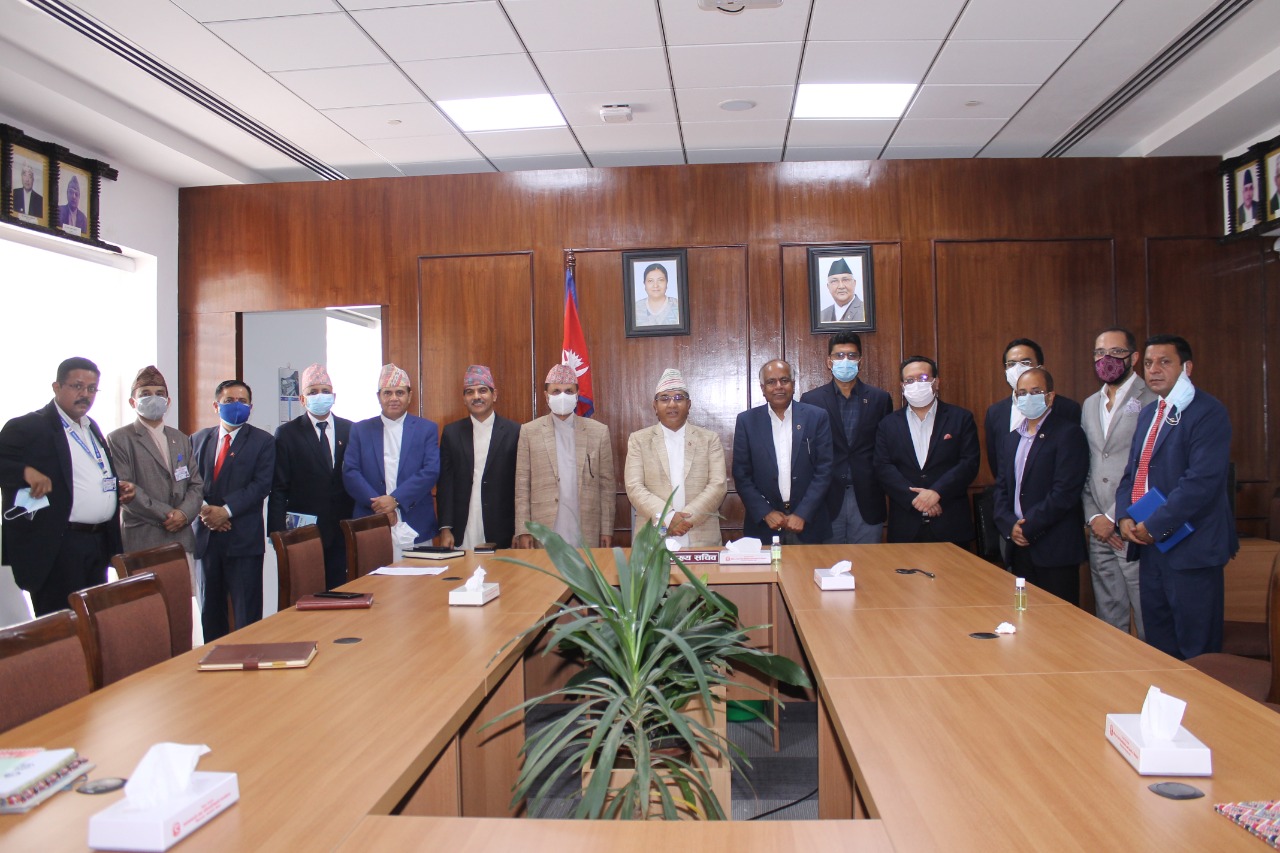Make in Nepal Swadeshi Summit 2022; How capable are we in terms of production, trade, and export?
Amidst the increasing economic dependence of Nepal on other countries and continuously degrading credibility for FDI, ease of doing business, and the share of productive sectors to the GDP, a summit of four-panel discussions was held at Everest Hotel on May 23.
Make in Nepal Swadeshi Summit 2022 was organized by the Confederation of Nepalese Industries (CNI) in partnership with Kantipur Media Group where various politicians, business persons, policymakers, bureaucrats, and economists participated in panel discussions on four different topics that centered on the SWOT analysis of the productive sectors of the country and way forward to promote “Make in Nepal ” agenda so as to strengthen the economic condition in the long term.
Panel 1: Attracting FDI to Increase Production
This panel was moderated by Dipendra Chaulagain, Director of Sambriddhi Foundation.
The discussion mainly focused on the prevailing challenges in the inflow of FDI in Nepal and its proper utilization. Hemraj Dhakal, Vice President of CNI, stressed on the importance of FDI to make Nepal independent by improving domestic production and export.
The prevailing FDI policy suggests that Nepalese companies can not accept less than Rs 5 crores in investment from abroad which is a bit vague and unfair for SMEs. Also, he suggested that the policy should be amended such that the minimum threshold of FDI must be segregated according to the nature of the sectors.
Similarly, on behalf of ICRA Nepal, the popular rating agency which has been rating various companies, securities of the companies, public enterprises, BFIs, and others, the Business Head of ICRA Nepal, Barsha Shrestha pointed out that Nepal has a weak sovereign rating which has been one of the barriers in the inflow of FDI as required in Nepal.
From the policy implementation perspective, Governor Maha Prasad Adhikari said that NRB has been positive toward bringing FDI in Nepal primarily through green and brown investments. As there is a chance of foreign investors wiping out a major chunk of the profits as dividends after investing in Nepal, there has been given more emphasis on brown FDI investments such that Nepalese companies too can get a considerable share of the profit.
Economist Dr. Achyut Wagle showed the Nepali banking sector is losing its leverage to bring in FDI despite having the capacity to collaborate with the foreign banks and agencies for this task. Moreover, he suggested that FDI can serve quicker if more and more investments are made in industries and companies that are linked with the originating countries.
For instance; Unilever Nepal, a regional subsidiary of Hindustan Unilever can bring in FDI from India such that both countries can benefit from it.
Panel 2: Legal Barriers to Enhancing Productivity
Moderated by Sabin Mishra, Director of CNI, this session focused on the legal barriers to enhancing the productivity of labor where the speakers stressed mainly on two aspects:
- Improvement in the regulatory environment for the industries
- Enhancement in productivity and minimizing production cost
Regarding the issue of the barriers in the legal environment for the businesses and industries in the Nepali economy, Bindenra Raj Pandey, Vice President, CNI, revealed that the share of manufacturing industries to GDP is 5.6% at present, contrary to 9% in 2000.
Chhaya Sharma, Chairperson, Women Leadership Forum, CNI, stressed that there is a leading role of the private sector in the economic progress of any country. The provision of granting collateral-free loans up to Rs 15 lakhs as Mahila Udhyamshil Karja (Women-Led Businesses) is a relief for SMEs run by women. Such policies have facilitated the business and productive sectors to some extent.
She raised a prevailing issue in this regard,
“While the government has been promoting “Made in Nepal” campaigns in a subtle way, this effort might somehow be deterred by the The Consumer Protection Act, 2075 as it might invade the right of choice to consume by the consumers.”
Former Finance Minister Barshaman Pun said that there have been various improvements in the legal aspects and policy aspects to facilitate the businesses like- the one-window policy, the establishment of the Nepal Investment Board, etc. However, there is some room for improvement in the domain of labor relations and trade union concepts.
Uday Raj Sharma, Secretary to the Government of Nepal, on the contrary, pointed out that the working culture of the youths in Nepal has not been as per the expectations of the job providers. Hence, the country is lagging in the proper utilization of available human resources, whereby importing human capital from abroad at a low cost.
In the closing remarks for this session, Labor, Employment, and Social Security Minister, Kishan Shrestha pointed out that there must be the coordination among the policymakers, business owners, and laborers for the proper planning and implementation of production and labor-related policies along with optimum utilization of the available human resources.
Panel 3: Where is the land for Industrial Use?
Moderated by Media Journalist Neetu Pandit, this discussion mainly focused on the issue- How easy is it to make the required land available for the establishment of industries? And how can it be improved?
Hari Bhakta Sharma, the Former Chairperson of CNI told that there has not been any new establishment of industrial areas in Nepal in the last 30 years. The existing industrial areas have been operating from the start on their capacity with the land provided by the government under the provision for industrial areas or Special Economic Zone (SEZ). Also, the newly established industries are compelled to manage the land on their own, either buying or leasing.
He further added, “The attention of the governments after the rise of federalism is towards other infrastructures than the development of industrial infrastructures which is a bit saddening reality.”
Ram Krishna Khatiwada, CEO of Nepal Infrastructure Bank, revealed that the heavy portion of the land assets in the industries is increasing production costs which is a major problem. The problem lies in the government handling these Special Economic Zone, Export Promotion Zone, etc, whereas their productivity might have been increased more if handed over to the private sector like in other emerging economies like India, Cambodia, the Philippines, etc.
Dr. Surendra Pandey, Former Finance Minister shared that until and unless there is a no-tax policy for the use of land for the agricultural and industrial sectors, they can neither minimize the production cost nor maximize the productivity. Moreover, the government has failed to recognize and categorize land types in terms of agricultural, forest, industrial, residential, and others.
Panel 4: Boosting Domestic Output and Promoting Export
While the imported goods are invading the Nepali market and narrowing the exposure of Nepali products inside the country, there is a big challenge for Nepal to lessen the harm caused by increasing the trade deficit and decreasing imports.
Arjun Pokhrel, Secretary, Ministry of Industries, Trade, and Import said that we are still weak in terms of exports until and unless we make our national products more competitive with their international peers.
The Ministry has been working on policies to curb trade-led economy to production and manufacturing-led economy. The rising costs of production have been making it difficult for the Nepali industries to compete in the international market.
He further added,
There is a razor-edged challenge for local industries either to enhance quality or to minimize the cost. This can be done by introducing more technology-oriented production process in the industries. More than being self-reliant, we should more focus on mutual reliance such that imports and exports are closely balanced.
Bidushi Rana, Director of Kiran Shoes (GoldStar) shared her experience in GoldStar shoes,
“There are various threats like tax evasion, under-invoicing, wrong declaration and other problems in the imports of goods from the foreign market which has posed a threat in the self-reliance of existing industries in Nepal since those imported products are available in a lower price that beat the existing local products.”
Krishna Prasad Adhikari, CNI’s Vice President said that we are still lacking in entrepreneurship development and the structural enforcement of such culture.
He addressed that we need some stimulus package for the local businesses and industries and make it easier for the dissemination. Also, there must be a conscious effort in the consumption of local products. We need to create forward and backward linkages among SMEs, MSMEs, and bigger industries.

Dr. Swarnim Wagle, Former Vice Chairperson, National Planning Commission shared there has been dumping of foreign products by various countries in other importing countries. Also, there are some issues in governance that have led to the abuse of some policies for the benefit of some groups of importers only. Hence, some punitive measures to discourage cheap imports might solve the problem somehow like:
- Enforcement of law against cross border smuggling and tax evasions, dumping (if any)
- Spot checking for the products under Harmonized code list
- Implementing Soft and Hard Industrial policies to fix the failures in the coordination and specific industries respectively and internalizing innovation
So these all discussions lead to a conclusion that Nepal can move ahead in the “Make in Nepal Swadeshi Campaign” with proper planning and coordination
All the discussions focused on the challenges and opportunities in the economy which are most commonly posed to SMEs, MSMEs, and large industries. Though these kinds of discussions are more often considered to be really limited to a buzz for some days, followed by the slug in planning, coordination, and implementation, this effort of CNI must be appreciated. Also, in a joint collaboration with the Government of Nepal and its units, CNI is onboarding startups, businesses, and companies on a platform called SWADESHI.
Swadeshi is a multi-year campaign initiated by the Confederation of Nepali Industries (CNI) whose goal is to create a conducive environment for domestic industries, enhancing their competitiveness and stimulating demand for Nepali goods and services.











